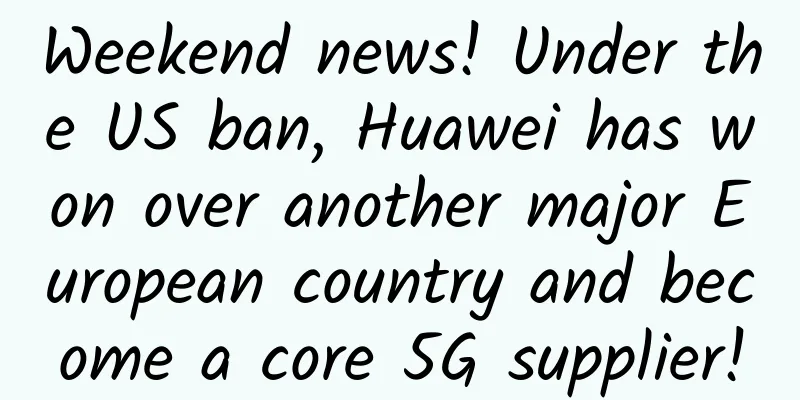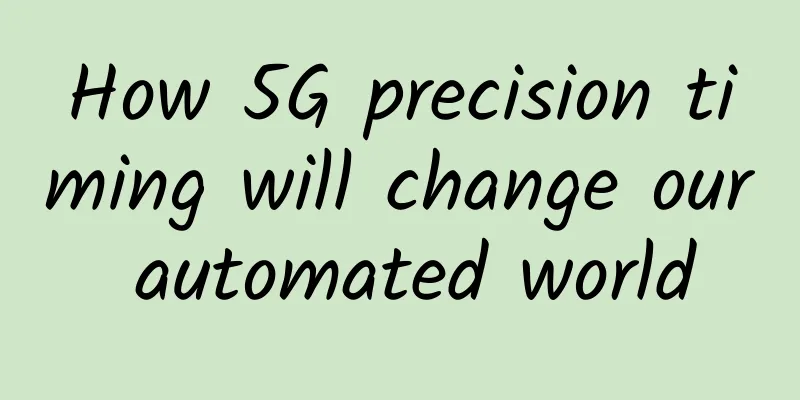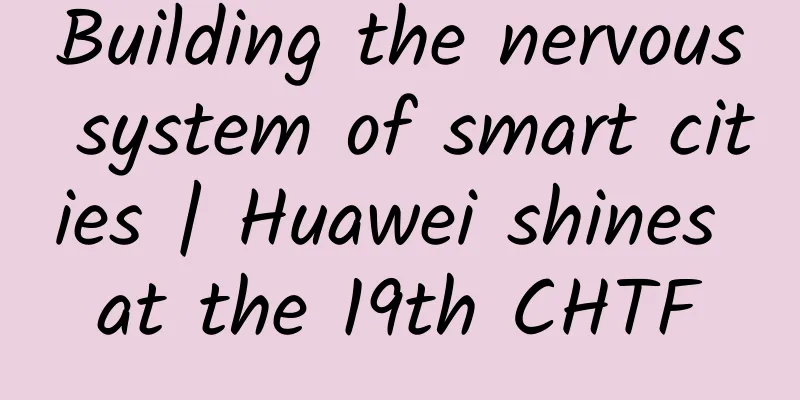Weekend news! Under the US ban, Huawei has won over another major European country and become a core 5G supplier!

|
Because of 5G technology, the United States has spared no effort in imposing "sanctions" on Huawei, and the expansion of Huawei's 5G business in overseas markets has also been greatly affected. However, a few days ago, another major country chose Huawei and officially launched a commercial 5G network without fear of US suppression. At the same time, with the official issuance of China's 5G licenses, the construction of domestic 5G networks has accelerated. Huawei's 5G orders have once again successfully surpassed Nokia, and it has returned to the top with 46 5G commercial contracts. Spain launches commercial 5G The core supplier is Huawei Today, Vodafone, a world-renowned telecommunications operator, officially launched a commercial 5G network in 15 cities in Spain. Spain has become another European country to launch a commercial 5G network after Switzerland and the United Kingdom.
△ Antonio Coimbra, President of Vodafone Spain, speaks at the launch ceremony of 5G services on June 10 Huawei helps 15 Spanish cities launch commercial 5G networks Vodafone, a world-renowned telecommunications operator, recently announced that it will launch a commercial 5G network in 15 cities in Spain on the 15th, which is today, and Huawei is the core supplier of this 5G commercial network. These 15 cities include Madrid and Barcelona, which will make Vodafone the first 5G network operator in the Spanish market. Spain will also become another European country to launch a 5G commercial network after Switzerland and the United Kingdom. On the 30th of last month, British telecom operator EE officially launched 5G services in six major British cities including London. EE said it will continue to use Huawei's equipment in some of its 5G network infrastructure.
△ On May 30, EE, a subsidiary of British Telecom, officially launched 5G services in six major cities in the UK. This is also the first 5G service officially launched in the UK. Spanish people welcome Huawei equipment for 5G services After learning that Vodafone's 5G commercial service will use Huawei equipment, local Huawei users in Spain expressed great expectations, and many people believe that Huawei's products are of excellent quality. Some people believe that Huawei has many competitive advantages compared with other brands, and the encryption system and other aspects make this brand trustworthy.
Enrique, a local resident of Spain: I started using Huawei four years ago and I like its design and technology, including its software and camera functions. Huawei has the best 5G technology and I am sure it will work well. China Mobile announces core network 5G orders: Huawei gets 52% On June 6, the day when the Ministry of Industry and Information Technology issued the 5G license, China Mobile released the "2019 Core Network Support 5G NSA Function Upgrade and Reconstruction Equipment Centralized Procurement Single Source Procurement Information Announcement", purchasing a total of 1,131 sets of equipment, with Huawei taking 52% of the share, ranking first. Ericsson took 34% of the share, ranking second. The remaining market share was shared by Nokia and ZTE, with Nokia taking 10% and ZTE 4%. Datang Telecom, another domestic telecom equipment manufacturer, did not receive any orders. China Mobile's procurement and bidding website shows that China Mobile's centralized procurement this time requires upgrading 450 sets of MME equipment in the existing network to support dual connections, bearer migration, traffic reporting and security functions, upgrading 681 sets of SAE-GW equipment in the existing network to support traffic reporting and other functions, and compensating the traffic processing hardware of the existing EPC core network SAE-GW equipment. Huawei received the largest orders for MME equipment and SAE-GW equipment, with 219 and 369 sets respectively. Ericsson, which ranked second, received 153 and 231 sets respectively. Nokia received 56 and 60 sets respectively. ZTE received 22 and 21 sets respectively. It should be pointed out that the 5G purchases currently announced by China Mobile are all small-scale 5G equipment purchases. It is worth mentioning that in January this year, China Mobile purchased 500 base stations for the 5G test network, of which Huawei accounted for 50%, Ericsson accounted for 22%, ZTE accounted for 16%, and Nokia and Datang accounted for the same 6%. China's 5G patents account for nearly 40% of the world's total Recently, patent data company IPlytics released a 5G patent report. The report pointed out that as of April 2019, Huawei had 1,554 5G standard essential patents, ranking first in the world. Four Chinese companies own 36% of the world's 5G standard essential patents. Standards-Essential Patents (SEPs) are considered to be irreplaceable technical patents in the process of business development. Nearly 2% of the current 4G smartphone supply price is patent royalties. According to intellectual property experts, in the 4G market, companies with patents have become major players. Specifically for each company, Huawei is currently the company with the most 5G standard essential patents in the world, reaching 1,554, accounting for 15% of the global total; followed by Nokia, with 1,427 SEPs, accounting for 14%; Samsung ranks third, with 1,316 SEPs, accounting for 13%. The remaining top ten companies and the number of SEPs they own are: LG (1,274), ZTE (1,208), Qualcomm (846), Ericsson (819), Intel (551), China Academy of Telecommunications Science and Technology (545), and Sharp (468). Chart source: IPlytics report Some analysts believe that companies with standard essential patents have considerable patent income, which improves the price competitiveness when setting up base stations and providing new equipment such as 5G smartphones. Countries where companies with a large number of standard essential patents are located can also build 5G infrastructure at a low price, making it easier to promote the popularization of next-generation services. In addition to the number of patents, it is also very important to have important patents that are used frequently. Huawei's global 5G orders surpass Nokia again While winning the title of the company with the most 5G standard essential patents in the world, Huawei recently received another piece of good news. On June 10, Foreign Ministry spokesman Geng Shuang pointed out that as of June 6, Huawei had obtained 46 5G commercial contracts in 30 countries around the world. Huawei, ZTE, Ericsson and Nokia are in fierce competition for global 5G orders. Currently, Huawei has 46 orders, Nokia has 42, ZTE has 40, and Ericsson has 19. It is worth mentioning that at the beginning of this month, Nokia announced on its official website that the company has confirmed 42 commercial 5G orders worldwide, with well-known customers including T-Mobile, Japan's SoftBank, etc. Nokia said at the time that it had surpassed Huawei in the number of commercial 5G contracts. However, combined with the remarks made by the Foreign Ministry's top diplomat, Nokia has not surpassed Huawei in the 5G field. At the end of May, British telecom operator EE and Huawei officially launched the country's first commercial 5G service. After the 5G network was launched, the British Broadcasting Corporation (BBC) broadcast live news based on the 5G network. The BBC used a 5G terminal to broadcast the historical moment of Britain entering the 5G era to TV stations. This was also the world's first live TV broadcast based on a commercial 5G network. Huawei's role as a 5G supplier for EE and another British operator Vodafone has eliminated market concerns about Huawei's entry into the European market and possible delays in the global 5G process. EE CEO Marc Allera said: "There is a lot of news about security at the moment. Our 5G launch is provided by multiple suppliers, and Huawei is an indispensable part." Don't do business with Huawei. Some suppliers have lost 40% of their revenue! 21Tech (WeChat ID: News-21) reported earlier that once the Huawei incident occurred, all global suppliers in the industry chain were affected. An engineer from Silicon Valley posted on a forum, "Our company has not slept for more than 36 hours in the past few days (a few days after May 16). The entire company has been working at full capacity to ship goods to Huawei. We stayed up all night (Friday) and delivered all finished and semi-finished products to Huawei as long as they were available. Silicon Valley has been hit hard by Trump. Even worse than our company are some US device suppliers who have lost 30 to 40 percent of their revenue by not doing business with Huawei." In the eyes of this engineer, Silicon Valley companies are "retaliating in their support of Huawei". "Domestic pre-sales staff basically stay up all night and work hard to sign orders. A process that normally takes one and a half months can be signed in three hours. The headquarters also works in shifts to sign as many orders as possible before the ban is issued. All other customer matters are put aside, and all R&D work is delivered to Huawei." On May 20, US Internet and semiconductor companies began a new round of adjustments. So far, the news about suppliers has been inconsistent, as companies are investigating products and communicating solutions. There is also opposition to the policy in the industry, and the next Sino-US negotiations will also affect the choices of suppliers. Citizens and experts criticize the US for suppressing Huawei As Sino-US economic and trade frictions escalate, the United States has suppressed Huawei, which has caused strong dissatisfaction among Huawei users in Spain. Many Spanish people said that the US move violated the rules of the free market.
Eric, a local resident of Spain: I think what the United States is doing is very bad, because the entire Western world is advocating free markets, but it does not allow the East to have the same channels. In addition, Spanish economist Juan Dugorres said that the US suppression of Huawei can be said to be shooting itself in the foot, and its actions will instead have adverse effects on companies in the United States and its Western allies. South Korea's 5G evaluation shows Huawei equipment has the most stable support service In addition, in South Korea, where 5G commercial networks have been launched, a media reporter conducted an evaluation. South Korea's Dong-A Ilbo reported on the 12th that reporters used LG and Samsung mobile phones to evaluate the 5G networks of the three major telecommunications service providers in multiple densely populated places in Seoul, and the results showed that LG U+'s service was the most stable. LG U+ is the only one of the three major telecommunications service providers that uses Huawei equipment to build a 5G network. However, some people believe that LG U+ first focused on building a 5G network in the metropolitan area, and the evaluation is not comprehensive enough. |
<<: Five changes that 5G will bring to operators
Recommend
World Cup employees are distracted and use enterprise-level routing to control
The World Cup has entered the semi-finals, with F...
5 wireless IoT communication trends to watch in 2020
Everything is going wireless. According to a new ...
The 10 coolest software-defined networking technologies of 2017
Software is driving the innovation engine of the ...
HostXen: US/Japan/Hong Kong VPS 6GB memory from 70 yuan/month, new users register to get 20 yuan
HostXen is a domestic hosting company founded in ...
First in China! Yunke Tongminghu Application Delivery Controller passed the Financial Information Innovation Ecological Laboratory Adaptation Verification
Recently , the Cloud Technology Tongming Lake App...
It’s time to understand HTTPS and the encryption behind it
HTTPS (Hypertext Transfer Protocol Secure) is an ...
MIIT: 4G and 5G will coexist for a long time, and 5G will not be built to dismantle 4G or limit speed
On August 22, Wen Ku, Director of the Communicati...
What is the difference between a wireless AP and a wireless router? Why is a wireless AP more expensive than a wireless router?
When many friends are doing network coverage, the...
The 6th generation of Wi-Fi technology is here! Speed upgrade
While we are still struggling to decide whether t...
4G network speed slows down? Ministry of Industry and Information Technology talks with three operators on this issue
On the 22nd, the Ministry of Industry and Informa...
5G+edge computing is in the first stage
On March 3, 2020, GSMA released the report "...
HostDare: 10% off on CN2 GIA VPS in Los Angeles, starting at $44.99 per year
HostDare launched a promotion for the CKVM series...
IDC Commentary: The 6G that powerful countries are competing for may be just a pipe dream!
With the issuance of licenses and several major o...
Some Europeans are extremely resistant to 5G, which will only accelerate their elimination
It is globally recognized that 5G is the trend of...
Record-breaking! US 5G license auction turnover has reached $69.8 billion
According to the Chinese website of the Wall Stre...









